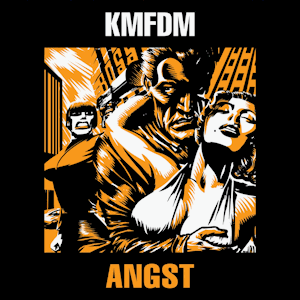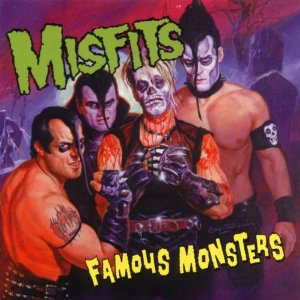
Angst is the seventh studio album by German industrial band KMFDM, released on October 13, 1993 by Wax Trax! Records.

Hope Is Important is the debut studio album by Scottish rock band Idlewild, released 26 October 1998 through Food Records. After finalizing their line-up and releasing two singles in 1997, the band released their mini album Captain in early 1998. Afterwards, the band signed with Food Records, and recorded their debut album between February and June 1998 at Chapel Studios in Lincolnshire and Westland Studios in Dublin with producer Paul Tipler. Described as a grunge and punk rock album, Hope Is Important was compared to Bleach (1989) by Nirvana.

Firewater is an American band founded by American singer/instrumentalist Tod A. in New York City in 1995, after the breakup of his previous group Cop Shoot Cop. A self-described "world punk" band, Firewater incorporate diverse elements of world music with punk rock rhythms, including cabaret, ska, jazz, folk and most notably Eastern European influences such as klezmer and gypsy music, which has led to their inclusion in the gypsy punk genre.

Through Being Cool is the second studio album by American rock band Saves the Day, released on November 2, 1999 by Equal Vision. The songs on Through Being Cool were written while the band members attended New York University. The album was recorded in 11 days and represented the band's transition from a melodic hardcore sound to a more pop punk style. It was produced by Steve Evetts at Trax East Recording Studio in South River, New Jersey. The band's members dropped out of college to tour alongside Snapcase, New Found Glory, Hot Water Music, and Face to Face, among others. A music video was filmed for the song "Shoulder to the Wheel."

"Songbird" is a song by English rock band Oasis, from their fifth studio album Heathen Chemistry, and is the first single by Oasis written by vocalist Liam Gallagher. Released on 3 February 2003, the song reached number three on the UK Singles Chart, number two on the Canadian Singles Chart, and the top 10 in Ireland and Italy. During an interview with The Matt Morgan Podcast, Liam's brother and bandmate Noel Gallagher called the track a "perfect" song.

Famous Monsters is the fifth studio album by the American punk rock band Misfits, released on October 5, 1999. It is the second in the post-Danzig era of the band, and the last album to feature Doyle Wolfgang von Frankenstein, Michale Graves, and Dr. Chud, who would all quit the band in 2000.

The Phenomenauts are a musical band from Oakland, California, that combine several styles of music with a futuristic science fiction theme. Their sound uses elements from rock and roll, punk, glam, garage rock and new wave styles of music. They call their style "rocket roll".

Apartment Life is the second studio album by American band Ivy, released by Atlantic Records on October 6, 1997. After being dropped from Seed Records following the release of Realistic in 1995, the group signed to Atlantic due to connections that Adam Schlesinger had with the record label. In addition to band members Andy Chase and Schlesinger, the album was produced by Lloyd Cole and Peter Nashel. In contrast to their previous releases, such as Lately (1994) and Realistic, Apartment Life is a pop album with varying forms of production consisting of keyboards, brass, and string instruments. Some of the compositions featured on the record were compared to the works of My Bloody Valentine, Pixies, and the Smiths. To promote the album, Ivy embarked on a series of promotional tours across the United States.

The Future of What is the third studio album by the American post-hardcore band Unwound, released on April 24, 1995 by Kill Rock Stars. The album was recorded in December 1994 at John and Stu's in Seattle, Washington.

Repetition is the fifth studio album by the American post-hardcore band Unwound, released on April 9, 1996 by Kill Rock Stars. It was recorded in January 1996 at John and Stu's Place in Seattle, Washington and produced by Steve Fisk and John Goodmanson. The album received positive reviews from critics.

Anahata is a studio album by Louisville-based math rock band June of 44, released on June 10, 1999, by Quarterstick Records.

Challenge for a Civilized Society is the sixth studio album by the American post-hardcore band Unwound, released on January 13, 1998 by Kill Rock Stars. It was produced by Steve Fisk and recorded from August 1, 1997, to August 15, 1997, at John and Stu's in Seattle, Washington. The album received positive reviews from critics.
Jetset Records was a New York-based indie rock record label. Founded by Shelley Maple in 1996, the label's first release was a reissue of German punk rock band The Golden Lemons' fourth album, Punkrock. The label has released music by a variety of independent bands, including Firewater, Sun Kil Moon and Mogwai.
Macha was an experimental post-rock band from Athens, Georgia composed of brothers Josh McKay (founder/singer/multi-instrumentalist), Mischo McKay (drums/percussion), Kai Reidl (multi-instrumentalist) and Wes Martin (multi-instrumentalist). Macha's music combined the precision tension-and-release post-rock of Mogwai with the lush, hypnotic grind of My Bloody Valentine, along with elements of post-punk, kraut-rock and especially Indonesian Gamelan. The CMJ New Music Report opined that the band "may have invented a new genre - call it Indo-rock." They incorporated a variety of instruments into their sets: Javanese zither, Balinese bamboo flute, hammered dulcimer, Hawaiian slide guitar, talempong nipple gongs and Nepalese shawms, vibraphone, and a 1970s-era thrift-store organ called the Fun Machine.

Get Off the Cross, We Need the Wood for the Fire is the debut studio album by Firewater, released on October 22, 1996 by Jetset Records. It is a marked difference in sound from Tod Ashley's previous work in Cop Shoot Cop. In 2017, the album was re-issued on vinyl in celebration of the twentieth anniversary of its release by Checkered Past Records.

American Football, also known retrospectively as LP1, is the debut studio album by American rock band of the same name, released on September 14, 1999, through Polyvinyl. It was recorded shortly after the band released their debut self-titled EP through Polyvinyl in October 1998. The group, consisting of vocalist/guitarist Mike Kinsella, guitarist Steve Holmes, and drummer Steve Lamos, recorded their debut album at Private Studios in Urbana, Illinois, with production from Brendan Gamble.

Beheaded is the second studio album by Texas-based indie rock band Bedhead, released 1996 through Trance Syndicate. The album was released in the United Kingdom through Rough Trade, and was reissued on compact disc format through Touch & Go Records on February 20, 2001, along with the band's other two albums WhatFunLifeWas and Transaction de Novo. The album was included in the Numero Group's 2014 boxset 1992–1998 and was also released separately on LP format.
Kara Grainger is an Australian soul blues and roots rock singer-songwriter, based out of Nashville, Tennessee, United States. She played with the Papa Lips band starting in 1994. In 1998, they were awarded the "Best New Band" award at the Australian Blues Music Awards. They changed their name to Grainger in 1998 and continued to play together until 2001. She signed as a solo artist with Craving Records in 2006.
Excursion on the Version is the second and final album by the English dance band Beats International, released in 1991. The title refers to the reggae terminology for borrowing sounds and rhythms from existing songs to create new versions; Norman Cook adopted the phrase to describe his production methods.















